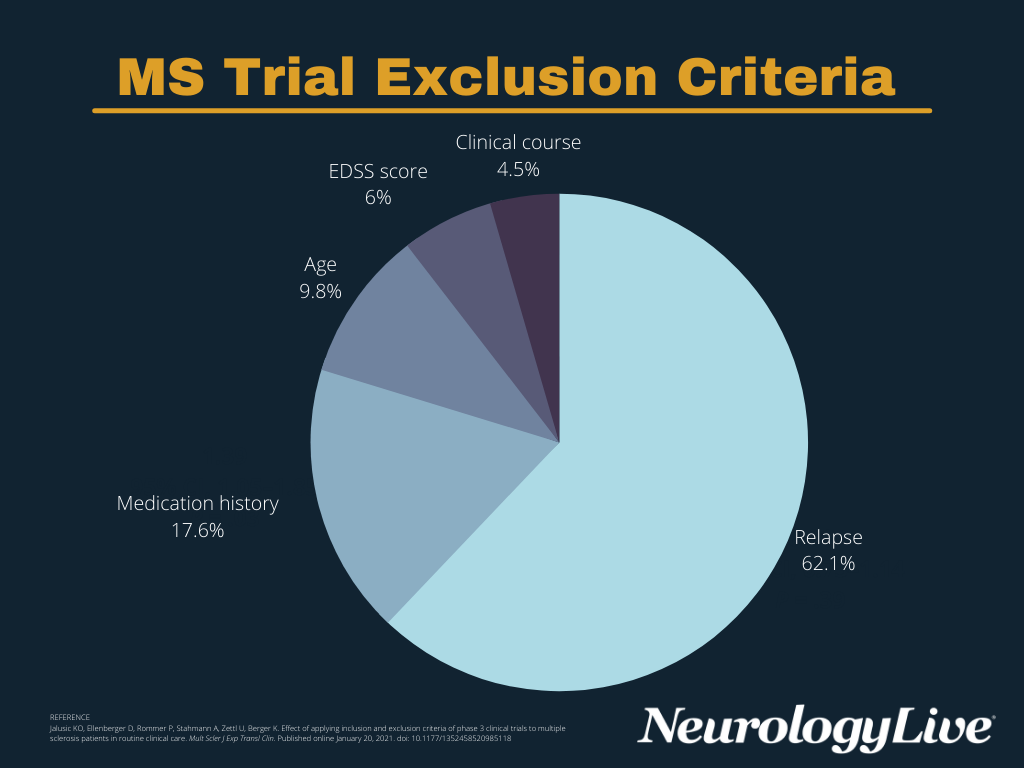Relapse, followed by medication history and age, was among the highest exclusion rates for MS trials across different disease-modifying therapies.
Despite the strict inclusion and exclusion criteria for phase 3 multiple sclerosis (MS) clinical trials, researchers have now documented that a majority of patients with MS treated in routine care would not meet those criteria, and exposed the fact that efficacy and safety of therapies in clinical trials can differ from those measures in the real world.
An analysis of 3577 patients with MS treated with 4312 therapies revealed that 83% of registered patients from a routine care setting would not have been eligible to the respective phase 3 clinical trial. Relapse was the single most frequent criterion not fulfilled (74.7%), followed by medication history (21.2%).
Lead author Kris O. Jalusic, MSc, Institute of Epidemiology and Social Medicine, University of Muenster, and colleagues wrote, “broader phase 3 inclusion criteria would increase the eligibility and contribute to a better generalizability of the results in clinical trials.”
The majority (93.5%) of patients included in the study were diagnosed with relapsing-remitting MS (RRMS), while 4% of patients had secondary-progressive MS (SPMS) and 2.5% had clinically isolated syndrome (CIS). Patients with primary-progressive MS were excluded from the study.
Across all analyzed drugs, 714 (16.56%) treatments would be used in a phase 3 clinical trial for those who met all the prespecified analysis criteria applied. Furthermore, if “relapse” was dropped from the selection criterion, 2909 (67.5%) patients would have fulfilled all other prespecified analysis criteria and would therefore have been included into the respective phase 3 clinical trial.
A closer look at the reasons for exclusion revealed that 11.8% of the analyzed patients did not meet the criterion “age,” whereas 7.2% of the patients did not conform with the Expanded Disability Status Scale (EDSS) score criterion. Notably, “clinical course” led to exclusion in 5.4% of patients, the lowest of any reason observed (FIGURE).

Jalusic and colleagues also analyzed the percentage of patients in routine care who would have been selected for a phase 3 clinical trial of their respective drug. Among them, 21.7% of patients treated with alemtuzumab and 20.8% of patients receiving natalizumab fulfilled all 5 selection criteria, showing the highest concordance with clinical trial criteria.
On the opposite end, the lowest concordance was seen with ocrelizumab (7.6%) and interferon (4.0%). Additionally, fulfillment of all 4 admission criteria was seen in 27.7% of patients treated with fingolimod and 20.22% of those on glatiramer acetate.
When excluding “relapse” from the selection criterion, patients with alemtuzumab and dimethyl fumarate had 76.5% and 74.6% concordance with the 4 selection criteria of the phase 3 clinical trials, respectively, the highest among any of the treatments. In contrast, cladribine (41.2%) and ocrelizumab (39.5%) showed the lowest.
“An integration of a prior generalizability studies, a posterior generalizability studies, and randomized clinical trials would result in an improvement in the drug life cycle in consideration for a safe and efficient drug therapy. Another approach in the implementation of clinical trials in clinical care routine could be the establishment of registry-based randomized clinical trials,” Jalusic et al concluded.
In addition to the aforementioned most frequent inclusion criteria, most patients within those studies were aged between 18 and 55 years, had an RRMS clinical course with at least 2 years prior to randomization or 1 relapse in the year before, and/or had a magnetic resonance imaging (MRI) scan of the brain showing abnormalities consistent with MS. The inclusion criteria “MRI scan” was not applied in the study due to limited data.
REFERENCE
Jalusic KO, Ellenberger D, Rommer P, Stahmann A, Zettl U, Berger K. Effect of applying inclusion and exclusion criteria of phase 3 clinical trials to multiple sclerosis patients in routine clinical care. Mult Scler J Exp Transl Clin. Published online January 20, 2021. doi: 10.1177/1352458520985118
Stay informed with MS news and information - Sign-up here
For MS patients, caregivers or clinicians, Care to chat about MS? Join Our online COMMUNITY



